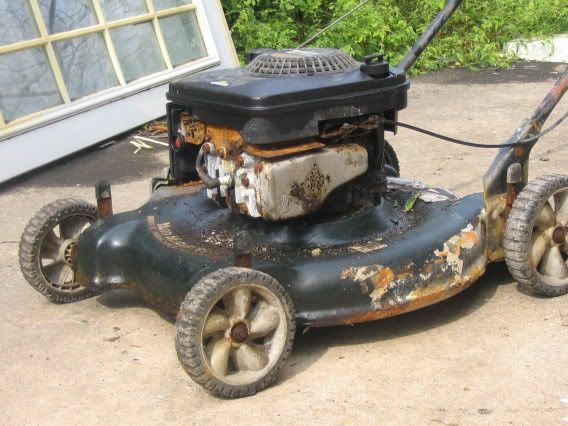So I drove around the neighborhood to see what’s been happening. There’s another house gone at the other end of the block, and new piles of debris on the next street—looks like a group in a van with Indiana plates working one house.
And then I drove past Pratt Park—a wide, grassy playground with a really nice playscape in the middle. I saw a couple people working, and pulled up.

I was greeted by Casey of the Blue Shed. Casey’s former house was on Pratt. The London Avenue Canal levee was his backyard. Although the levee opened about a block away, the destruction of his house was just as potent, and he has since demolished what remained of his home.
But he kept the shed.
Drive down Pratt today, and you’ll see a smooth sand-covered lot with a pretty blue shed tucked back in the corner. He now signs emails to our neighborhood listserv as “The Blue Shed.”
Casey has become a man with a mission. With no house to fix up, and recognizing the inability of the New Orleans to keep up with its parks, Casey adopted Pratt Park.
Nobody asked him to do it. He just sent out an email one day, saying something like, “I’m going to clean up the park. Anyone who wants to join me is welcome.” He’s been working at the park pretty much every Sunday since then; sometimes with help, sometimes on his own.
On this bright hot day, Casey was getting high-powered help from another neighbor. Using a gas-powered power washer, Hale was meticulously removing the baked-on film of Hurricane Katrina’s flood. Moving in carefully planned rows, Hale wielded the water-wand like a craftsman creating art.
Hale hasn’t yet decided what to do with his house, and only recently moved his wife and two young children back from Colorado to Metairie, right next door to New Orleans. When we talked about the future of the city, he put it this way: “There will be no single chicken emerging from one egg. New Orleans is going to rebuild over time so that there will be many chickens and many eggs all around the city.”
I think I agreed with him.
Now I’ve blogged about Hale before. He’s the rocket scientist that was very popular in our neighborhood because of his willingness to share his home-brewed beer. Hale is a mechanical engineer, so unlike yours truly the civil engineer, he was able to get his flooded power tools going again.
I said to Casey, “What can I do to help?”
“Well, you can paint those climbing bars over there, or you can cut grass.”
I think we all know what I chose!
Call me crazy, but I proceeded to have a whole lot of fun working a push mower through an expanse of grass about half the size of a football field!
As I pushed it along, I thought about us three neighbors, Casey, Hale and Tim. Three guys who pretty much lost it all in the hurricane, but who all found a reason, and the spirit, to come back.
Heck, Hale doesn’t even know if he’s coming back to Vista Park, but here he is, on his day off, working in the hot sun.
And when I got home, I found more than one offer of a loaned lawnmower in my email and in comments on this blog. Offers of aid and assistance from people I’ve never met, except through the cold glow of a computer hooked to the Internet.
I ask you, who would deny such people the right to rebuild their city? Who would dare tell such civic-minded, proud, pick-yourself-up-by-the-bootstraps Americans that theirs was a lost cause?

Yet another neighbor, April, heard of Casey’s efforts and took her children to Pratt Park to see for herself. I post some pictures she took here.
April reports, “My kids played on the equipment and the swings this evening and people from Edgewater Baptist were out there having a picnic!! Oh it made me want to be home so bad, I just wish I could close my eyes and walk back across the street on Pressburg and be home......but not yet.”
I failed to get my mower started on Sunday. And it was probably the best thing that could have happened.







